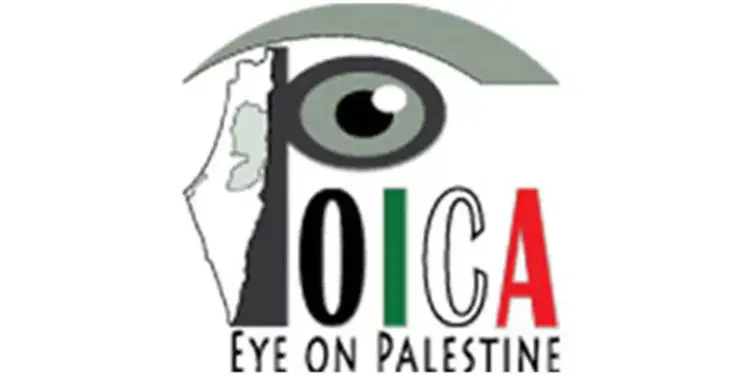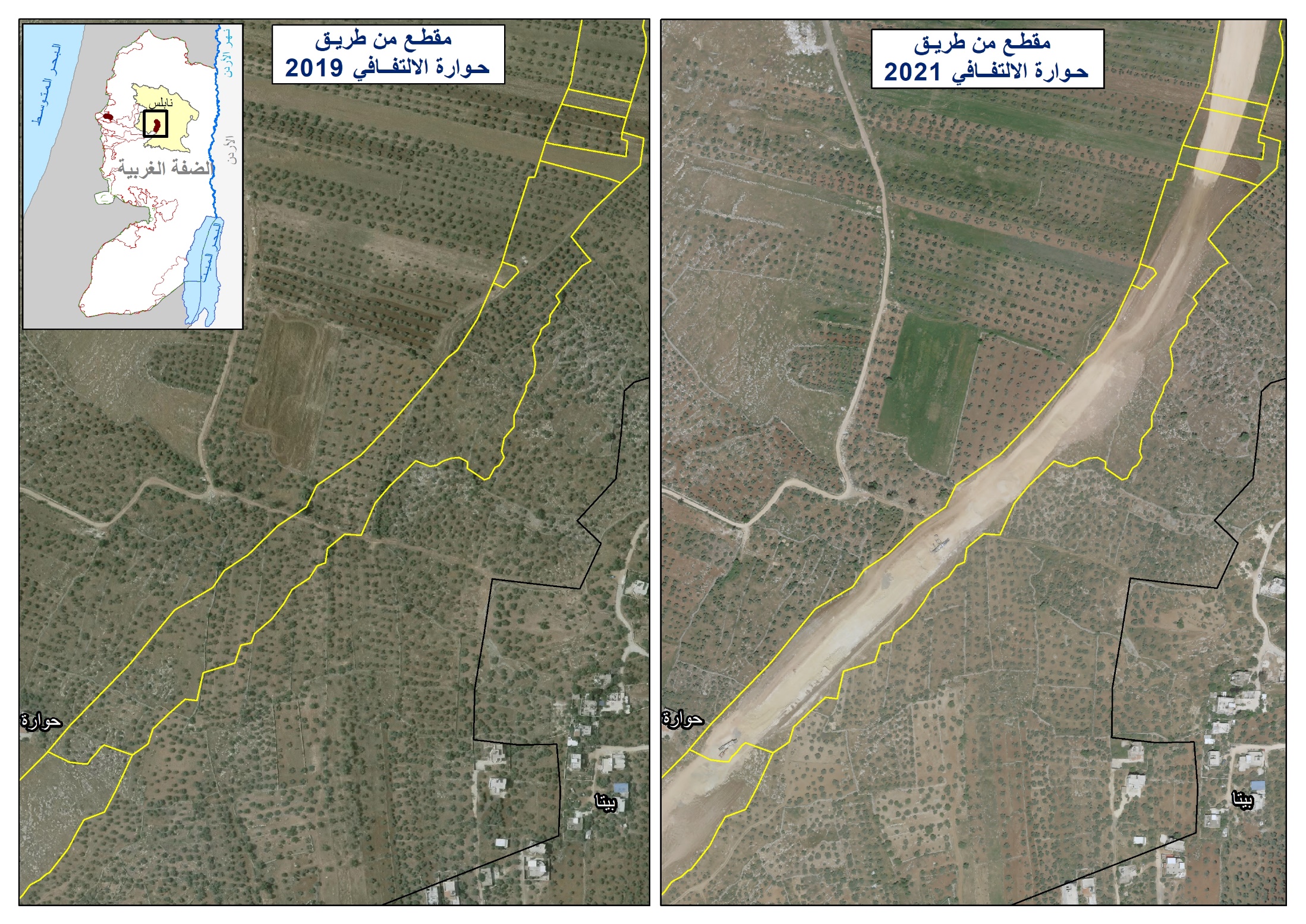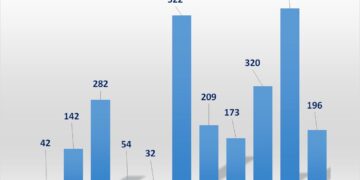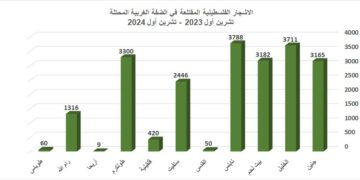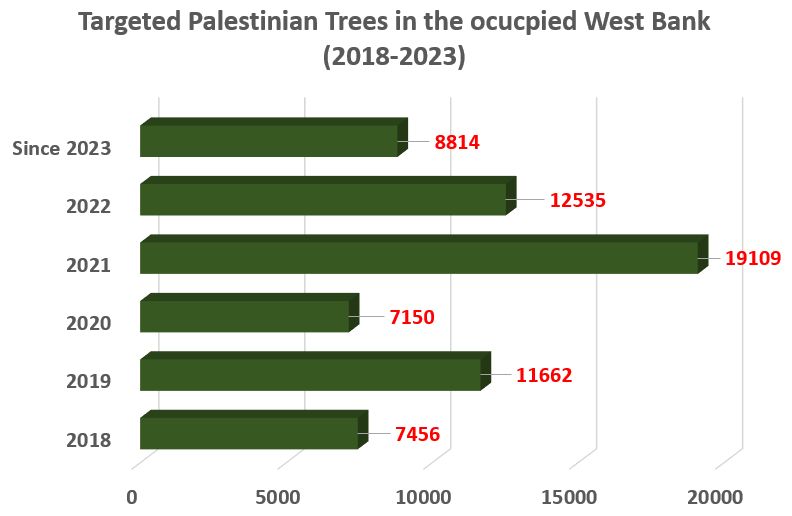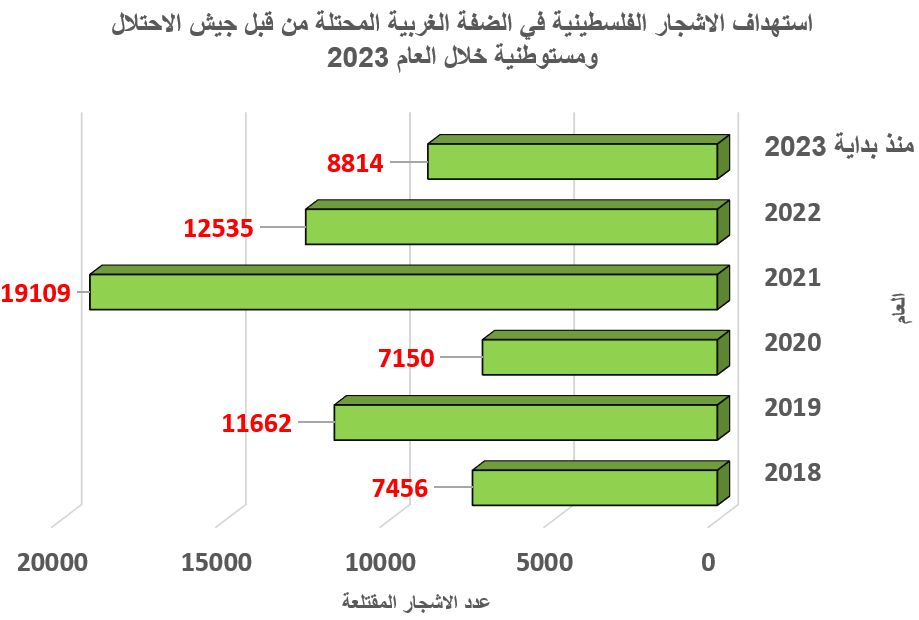|
No
|
Date
|
Governorate
|
Location
|
Violators
|
Victims
|
details
|
|
1
|
10/10
|
At Tayba, ‘Anin
|
Israeli Army
|
The locals
|
Delaying the opening of the gates of the wall. Forbidding 300 farmers from reaching their lands behind the wall.
|
|
|
2
|
12/10
|
‘Anin
|
Israeli Authorities
|
‘Anin Local Farmers
|
Not giving farmers the permits needed to pass the gates that lead to their lands.
|
|
|
3
|
21/10
|
Faqqu’a
|
Israeli Army
|
Local Farmers
|
Delaying the opening of the gates. Deliberately closing a gate for a whole day.
|
|
|
4
|
3/11
|
Beit Lid
|
Israeli Army, Avnei Hefetz colonists
|
Local Farmers
|
Preventing the farmers from reaching the lands nearby the Israeli colony.
|
|
|
5
|
18/7
|
Nablus
|
Burin
|
Yizhar colonists
|
Local Farmers
|
Burning 300 olive trees.
|
|
6
|
29/9
|
Nablus
|
Burin
|
Yizhar colonists
|
Heirs of Abdul Qader As’ad Omran, Abdul Mo’een ‘Awad, Ahmad ‘Awad
|
Uprooting and cutting 160 olive trees (20-35 years old)
|
|
7
|
7/10
|
Nablus
|
Burqa, Bizzariya, Sabastiya
|
Israeli Army
|
Local Farmers
|
Converting 400 dunums into a closed military zone and forbidding the farmers from reaching it
|
|
8
|
12/10
|
Nablus
|
Qaryut, Al Lubban ash Sharqiya
|
Israeli Army
|
Local Farmers
|
Forbidding the farmers from reaching their lands despite the fact that they have the needed permits on the pretext of safeguarding the colonists’ security.
|
|
9
|
15/10
|
Nablus
|
‘Azmut
|
Israeli Army, Alon Moreh colonists
|
Local Farmers
|
Preventing the farmers from reaching their lands near Eli and Maale Labona colonies despite having the needed permits.
|
|
10
|
15/10
|
Nablus
|
‘Asira al Qibliya
|
Israeli Army, Yizhar colonists
|
Local Farmers
|
Colonists, supported by the Israeli Army, forbade the farmers from harvesting the olive trees and placed an outpost in the area.
|
|
11
|
17/10
|
Nablus
|
Qaryut
|
Eli colonists
|
Mufeed Jaber (72)
|
Assaulting the said farmer while harvesting olives, he sustained several injuries and a fractured shoulder.
|
|
12
|
17/10
|
Nablus
|
Salim, Kafr Qallil
|
Israeli Army
|
Local Farmers
|
Forbidding the foreign advocates from helping the Palestinian farmers, also the Israeli Army threatened to fine any Palestinian who seeks help from foreigners.
|
|
13
|
18/10
|
Nablus
|
Burin
|
Israeli Army, Bracha colonists
|
Local Farmers including Mursi ‘Eid(35), Qasim Alnajjar(28), Jamal Alnajjar(24)
|
Tens of colonists attacked the farmers near the colony and threw stones at them in an attempt to prevent them from olive picking.
|
|
14
|
22/10
|
Nablus
|
Qaryut, Al Lubban ash Sharqiya
|
Eli colonists
|
Faisal Rasheed (5 dunums), Mohammad Rasheed (5 dunums)
|
Tens of settlers torched 10 dunums of olive trees.
|
|
15
|
25/10
|
Nablus
|
‘Iraq Burin
|
Israeli Army, Bracha colonists
|
Mohammad Qadus, Wa’el Qadus
|
Two farmers were shot while peacefully demonstrating against the colonists’ acts.
|
|
16
|
25/10
|
Nablus
|
Qaryut
|
Eli, Shilo, Shvut Rahel, Maale Levona colonists
|
Local Farmers
|
Colonists attacked the farmers to ban them from harvesting olives.
|
|
17
|
27/10
|
Nablus
|
Qaryut
|
Israeli Army, Shvut Rahel colonists
|
Mu’taz Ghassan (31), Isra’ Badawi (23)(sustained Injury in her eye), Jawad Albadawi, Jamal Kassab
|
Colonists attacked the farmers while harvesting olives despite the fact that coordination was made between the Israeli and Palestinian DCO to allow the farmers to peacefully harvest their crop. The Israeli Army did not interfere to stop the attacks.
|
|
18
|
12/11
|
Nablus
|
Burin
|
Yizhar colonists
|
Akram ‘Emran
|
Cutting down 80 olive trees.
|
|
19
|
9/11
|
Salfit
|
Yasuf
|
Taffuh colonists
|
Local Farmers
|
Preventing farmers from reaching their lands despite the fact that coordination was made between the Israeli and Palestinian DCO to allow the farmers to peacefully harvest their crop.
|
|
20
|
9/8
|
Qalqiliya
|
‘Azzun ‘Atma
|
Oranit colonists
|
‘Abdul Kareem Salamah
|
Setting fire to 100 olive trees located behind the wall.
|
|
21
|
2/10
|
Qalqiliya
|
Jayyus
|
Israeli Army
|
Local Farmers
|
Preventing the farmers from using gate 979 to get to their lands and letting them use the further gate 943.
|
|
22
|
4/10
|
Qalqiliya
|
Jinsafut
|
Israeli colonists
|
Abdul Hafiz Kamel
|
Colonists beat a farmer and stole his crop claiming that the land belongs to them.
|
|
23
|
7/10
|
Qalqiliya
|
Sabastiya
|
Israeli Army
|
Local Farmers
|
Preventing foreigners from helping Palestinian farmers.
|
|
24
|
10/10
|
Qalqiliya
|
Kafr Qaddum
|
Kadumim colonists
|
Fo’ad Abdul Qader, Sadeq Eshtewi, Omar Eshtewi, Saleh Eshtewi
|
Burning 146 olive trees.
|
|
25
|
10/10
|
Qalqiliya
|
Amatin
|
Kadumim colonists
|
Sayel Ghanem, Ahmad Ghanem, Mohammad Ghanem, Abdul Raheem Ghanem, Basel Ghanem
|
Torching 144 olive trees.
|
|
26
|
20/10
|
Qalqiliya
|
Kafr Qaddum
|
Kadumim colonists
|
Mohammad Eshtewi
|
Preventing farmers from picking olives and assaulting one of them.
|
|
27
|
22/10
|
Qalqiliya
|
Amatin, Far’ata
|
Israeli Army, Hifat Gil’ad colonists
|
Local Farmers
|
Uprooting 8 olive trees, preventing the farmers from reaching their lands located near the colony.
|
|
28
|
6/10
|
Deir ‘Ammar
|
Nahalil colonists
|
Abdullah Odeh Family
|
Cutting down 250 olive trees.
|
|
|
29
|
14/10
|
Dura
|
Israeli Army, Negohot colonists
|
Local Farmers
|
Forbidding olive picking.
|
|
|
30
|
21/10
|
Yatta
|
Susiya colonists
|
Mohammad Hosheiya, Samir Hoshiya, Jamal Hoshiya
|
Cutting down 17 olive trees.
|
|
|
31
|
21/10
|
Lands near the wall
|
Israeli Army, Israeli Civil Administration
|
Farmers who own land behind the wall
|
1500 families requested entrance to their lands behind the wall, the Israeli army considers the lands ‘buffer zone’ and nobody gets permits to reach it unless he proves his ownership of the land. Only 420 families applied for permits and only 212 families were granted them.
|
|
No
|
Governorate
|
Number of Trees
|
Number of Violations
|
|||
|
Uprooted or cut down
|
Torched
|
Gates Closure
|
Shooting and Beating
|
Banned from reaching their land
|
||
|
1
|
Jenin
|
|
|
2
|
|
1
|
|
2
|
Tolkarm
|
|
|
|
|
1
|
|
3
|
Nablus
|
1540
|
4550
|
|
4
|
6
|
|
4
|
Salfit
|
5720
|
|
|
|
1
|
|
5
|
Qalqiliya
|
8
|
390
|
1
|
2
|
2
|
|
6
|
Ramallah
|
250
|
|
|
|
|
|
7
|
Hebron
|
1267
|
400
|
|
|
2
|
|
Total
|
8785
|
5340
|
3
|
6
|
13
|
|
The Land Research Center
LRC


